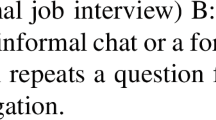Abstract
The purpose of this paper is to work toward an explicit logic and semantics for a game theoretically inspired theory of action. The purpose of the logic is to explicate the conceptual machinery implicit in the dialogue-game model of rational discourse developed in Carlson (1983).
A variety of ideas and techniques of modal and philosophical logic are used to define a model structure that generalizes the game theoretical notion of a game in extensive form (von Neumann and Morgenstern, 1944). Relative to this model structure, semantic characterizations are given to the action-theoretic notions oftime, possibility, belief, preference, ability, intention, action, andrationality. The unification of these characterizations under the game-theoretical paradigm leads to insights about the logical interdependences between these concepts.
The resulting theory of rational interaction is applied to the explication of rational dialogue. The main benefit of the enterprise for a theory of rational dialogue is that concepts and results of game theory become accessible to the explication of dialogue. In particular, the task of proving the logical coherence of a discourse is reduced to the task of showing the rationality of strategy choices made in an associated dialogue game.
Similar content being viewed by others
References
Carlson, L.: 1976, ‘Language Games and Speech Acts’, in F. Karlsson (ed.),Papers from the III Scandinavian Conference of Linguistics, Dept. of Phonetics, University of Turku, 1976, pp. 95–104.
Carlson, L.: 1981, ‘Aspect and Quantification’, in P. Tedeschi and A. Zaenen (eds.),Syntax and Semantics 14: Tense and Aspect, Academic Press, New York, pp. 31–64.
Carlson, L.: 1983,Dialogue Games: An Approach to Discourse Analysis, Synthese Language Library, Vol. 17, D. Reidel, Dordrecht.
Carlson, L.: 1988, ‘Quantified Hintikka-style Epistemic Logic’,Synthese 74, 223–262.
Chellas, B.: 1975, ‘Basic Conditional Logic’,Journal of Philosophical Logic 4, 137–153.
Cohen, P. and H. Levesque: 1987,Rational Interaction as the Basis for Communication. CSLI Report No. 87-89, CSLI, Stanford.
Dowty, D.: 1982, ‘Tenses, Time Adverbs, and Compositional Semantic Theory’,Linguistics and Philosophy 5, 23–55.
Fine, K.: 1970, ‘Propositional Quantifiers in Modal Logic’,Theoria 36, 336–346.
Fishburn, P.: 1977, ‘Models for Individual Preference and Choice’,Synthese 36, 287–314.
Hansson, B.: 1969, ‘An Analysis of Some Deontic Logics’,Nous 3, 373–398.
Hintikka, J.: 1962,Knowledge and Belief, Cornell University Press, Ithaca.
Hintikka, J.: 1969,Models for Modalities, D. Reidel, Dordrecht.
Hintikka, J.: 1978, ‘Answers to Questions’, in H. Hiz (ed.),Questions, Synthese Language Library, D. Reidel, Dordrecht, pp. 279–300.
Moore, R. C.: 1981,Reasoning About Knowledge and Action, Technical Note 191, SRI International, Menlo Park.
von Neumann, J. and O. Morgenstern: 1944,Theory of Games and Economic Behavior, Princeton University Press, Princeton.
Rescher, N. and A. Urquhart: 1971,Temporal Logic, Springer Verlag, Wien.
Spohn, W.: 1975, ‘Analysis of Hansson's Dyadic Deontic Logic’,Journal of Philosophical Logic 4, 237–252.
Author information
Authors and Affiliations
Rights and permissions
About this article
Cite this article
Carlson, L. Logic for dialogue games. Synthese 99, 377–415 (1994). https://doi.org/10.1007/BF01063995
Issue Date:
DOI: https://doi.org/10.1007/BF01063995




